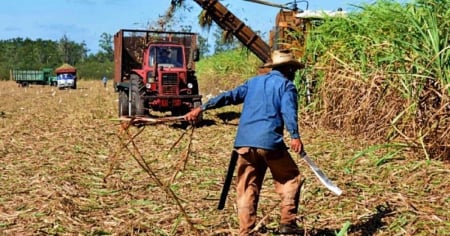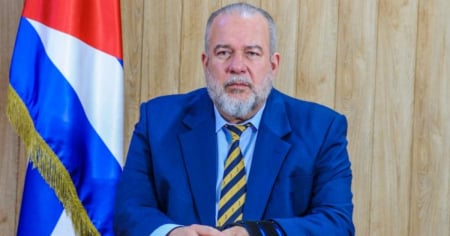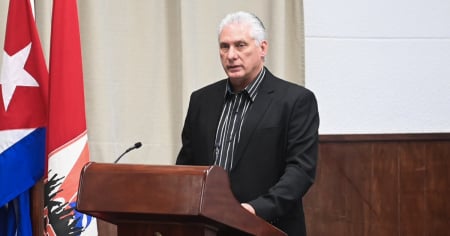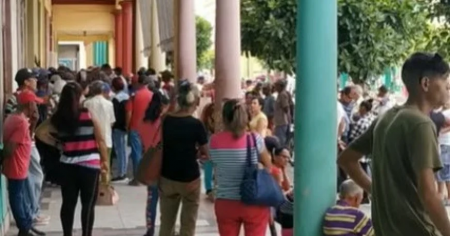
Related videos:
In the midst of the energy crisis facing the country, the Cuban government announced a salary increase for workers at the Electric Union starting in January 2025, in recognition of their "commendable work."
On Wednesday, during the session of the National Assembly of People's Power (ANPP), Prime Minister Manuel Marrero announced an increase in salaries for workers in the electric sector, in recognition of their efforts in challenging circumstances.
The low wages of workers following the implementation of the economic restructuring policy are one of the factors driving the labor exodus in Cuban thermal power plants and the pursuit of jobs in better-paying sectors.
Approximately 15,000 workers in the electricity sector left their jobs in 2021 and 2022 due to low salaries and the repeal of many benefits they previously enjoyed, which were eliminated with the Tarea Ordenamiento.
But this is just one of the factors affecting the severe crisis in the country, where on Thursday the Electric Union forecasted power outages due to a generation capacity deficit exceeding 1,700 MW.
In his remarks, Marrero described the situation of the national electro-energy system (SEN) as "very complex" due to the lack of foreign currency, which has led to delays in maintenance, technological recapitalization, a slowdown in updating the generation matrix, and fuel shortages.
As a result, there has been a loss of generation capacity in thermal power plants. "In the last five years, there has been a decrease in generation of about 3731 GWh," he specified.
In fuel and diesel engines, availability reaches only 39% and 37%, respectively, with a declining trend. Mobile generation also decreased by 24.2% compared to 2023, while renewable energy currently accounts for 4% of the total.
THE REGIME BETS ON SOLAR ENERGY, BUT BLACKOUTS PERSIST
Marrero stated that the government program for the recovery of the system, led by Commander Ramiro Valdés Menéndez, was approved to reverse the situation and gradually meet the demands of the population and the economy, with a focus on transition, energy sovereignty, and efficient energy use.
"We have received proposals of all kinds, but we cannot privatize the country's energy generation. We need to address the issues, but for generation to have that sovereignty, there must also be an efficient and rational use of energy," he stated.
The government has prioritized two photovoltaic solar energy projects, each with a capacity of 1,000 MW. The solar panels were acquired using national crude oil production and payments made with nickel.
The goal is for more than 500 MW of new capacity to be contributing to the system by the end of the first semester of 2025, with around 1,100 MW connected to the national electricity grid by the end of the year.
All of this is part of a "miraculous" plan by the regime for the recovery of the damaged national electrical system, aimed at providing a definitive and long-term solution to the crisis affecting the country.
According to the Minister of Energy and Mines, Vicente de la O Levy, it is a plan "to seek sustainable alternatives and solutions," which "has to do with our ability to generate electricity, with our means, our resources, and our capabilities"; something that appears more like an unattainable promise than a real possibility.
Frequently Asked Questions about the Energy Crisis and Salary Increase in Cuba
Why did the Cuban government decide to increase the salaries of electrical workers?
The Cuban government announced a salary increase for workers in the electrical sector as a recognition of their "commendable work" under adverse circumstances. The wage hike is a measure to reward the efforts of these workers in light of the complex situation facing the national electrical system.
What are the main issues facing the electrical system in Cuba?
Cuba's electrical system is facing various issues, including a lack of foreign currency, delays in maintenance, technological recapitalization, fuel shortages, and a significant decrease in energy generation. These problems have led to major disruptions for the population, including prolonged blackouts and system disconnections.
What actions is the Cuban government taking to improve the electrical system?
The Cuban government is investing in photovoltaic solar energy projects and is pursuing a focus on energy transition and sovereignty. They have prioritized two solar energy projects, each with a capacity of 1,000 MW, aiming to add 500 MW to the grid by mid-2025.
What impact do energy problems have on the Cuban population?
Energy issues have led to prolonged blackouts, impacting the daily lives of Cubans and generating social discontent. These blackouts, which in some cases last up to 12 hours a day, have hindered key sectors such as the economy and health care.
Why hasn't the energy crisis in Cuba been resolved?
The energy crisis in Cuba remains unresolved due to a lack of investment, fuel shortages, and outdated infrastructure. Despite government promises and announced plans, the results have been insufficient to address the current crisis.
Filed under:






